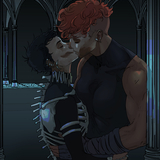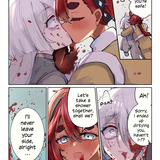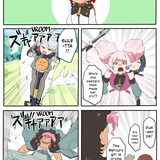Love how this chapter explores in detail one of the series' central themes and motifs- traces, specifically through the images of scars, rotting, bodies and remnants. A scar is an incredibly complex symbol, because it both fuels and undercuts the otherness that necessarily drives horror. On the one hand, a scar is inalienably tied to bodies, to life, to a corpus upon which it may be engraved, an ideal, unmarred form that it both suggests and smears, and yet scars also serve as inscriptions of death, of pain, of the vulnerability of the body, and of its biological, fleshy nature, refusing to let one cling to notions of a nonmaterial human essence. This churning, abject dichotomy instills in many people a sense of discomfort, leading them to stigmatize, essentialize, obscure or otherwise reduce the scarred subject to some manner of essence- the victim, the veteran, the monster, the survivor and so forth, symbolically replicating that very process of scarring, of a reduction and subtraction from the ideal form, which retroactively reinforces that very narrative, creating a vicious cycle that inscribes itself into the mind of the one who was scarred- that they've been left lesser for it, that they've become abject, dirty and soiled, that they'll never recover what was gone and, more importantly, never grow anything that might replace, surpass or otherwise improve their state. It is a mindset that Hinako has obviously imbibed, defining herself not only with reference to her scars, as a perennial leftover, a trace, a corpse-to-be, but as a scar in and of herself, because that is what her environment has reduced her to by constantly framing and viewing her as a victim, as someone who has suffered either That Which Must Not Be Spoken Of or That Which Must Always and Only Be Spoken of, either a silent sufferer walking by or an eternally medicalized diagnosis. Hinako in this sense may be read almost as a monster in and of herself, where monster suggests not necessarily a predatory entity, but an affect produced in the sociocultural imagination, a figure both alien and familiar, for it suggests in its plight what we shall one day face, or might have faced, a potential tragedy that must be cordoned off, explained away or profoundly personalized lest it become too universal- in short, an abjection, just like the pale hands reaching up from the beach, neither dead nor alive, but somehow all the more unsettling for it. Shiori calls them halfway between humans and monsters, but if humanity is an island and monsters are the ocean, then they may as well be halfway to infinity- a calculation that defies distance, logic, and tugs the seams of the coddled, untroubled mind apart, forcing us to see the telltale fingers and toes sticking out from underneath the stark white robe spread over our worldviews, suggesting that the world may well be a morgue. If we are to differentiate ourselves at all from these corpses, then they must be covered up or labelled, and that is what happens to Hinako- small wonder, then, that she already considers herself dead, and only awaits the second death, the inner death to accompany the outer, the death of sensation, of the child staring into the cracked mirror at the other to finally close her eyes and sink into a place beyond language, beyond the tyranny of signs that has designated her an anathema.
Miko, absent though she may be from this chapter, understands this extremely well, being a Scarred One herself- literally, in the tails she's torn off herself, becoming freakish both to humans and monsters, and in her more general narrative as a defeated monster who's now become a failed goddess, never quite fitting into any category. If Miko was judged solely on the basis of any of these archetypes, held beside an ideal type- the Apex Predator or the Mother Goddess- she would certainly be deemed a tragic failure, a leftover and a contradiction, because there shall always be a part of her that doesn't fit in, a reduction, a trace of that fleshy, material thisness, of who she is, of a complexity that cannot fit into a binary and is thus unsettling to most. And yet, in her own way, she feels the most human among the trio precisely because of this, solely due to her overflows, compromises, concessions and scars. Miko, in order to live with herself, to hold onto any sense of worth after her dual failures as beast and deity, had to have accepted the complexity of individuality, the inconsistency of uniqueness, the value of life in-and-of-itself, without being reduced to a narrative or a trope or a type. This is exactly why she can comfort Hinako, why she's the sole spot of light in Hinako's life- to Miko, Hinako's pain doesn't need to be discussed Right Now or shoved into some dark corner, but may be dealt with gently and spontaneously as and when it ebbs and flows. She doesn't essentialize Hinako, doesn't swell her into a Portrait of Our Times or reduce her into a Poor Traumatized Tragedy, but simply... lets her be, gives her space to breathe. Sadly, this isn't enough, because Hinako didn't recognize that her kindness came from a place of empathy until her self-worth was nearly too low to be salvaged, and indeed views Miko as too good for her, doing to Miko precisely what's been done to her, repeating the cycle of reductions by viewing her as this sunny angel who deserves to live for better things than managing some irrelevant accident survivor's trauma. The erasure of Hinako's complexity has in turn erased her ability to process complexity, and left her yearning indeed for simplicity on the other end of a life-death binary, a simplicity she sees in Shiori's open, unabashed monstrousness, viewing her as a perfect darkness in contrast to Miko's perfect light, and choosing the former, the Other Half of 'Halfway Between Human and Monster' that is in fact anything but equal, the dual lessness and excess of death.
But this chapter throws a wrench in that, because it hints that Shiori, too, is not free from that complexity, not capable of delivering Hinako oblivion, because just as Miko is not an absolute addition, Shiori is not an absolute subtraction- they're both neither parts and nor wholes, but variables, being at every given point more-than-themselves, just as Hinako is, regardless of how hard she tries to ignore that life is not a series of moments, but a tissue of potentialities. Shiori repeatedly undercuts the tension, stigma and abject otherness of Hinako's trauma in a way that's both similar yet different to Miko- while Miko gives Hinako distractions, new ways to perceive and define herself, and space, Shiori employs directness and humor to offset the terror of the hidden, as demonstrated by that delicious joke about how she'll yank Hinako's folks out of the waves and introduce herself. She's so incredibly blunt, unconcerned and different that Hinako's problems seem irrelevant before her, and so Hinako views her as an entity outside the moral cobwebs of signification, responsibility and meaning her environment has trapped her in, seeing her as an escape. But if Shiori wants, as she (increasingly unconvincingly) claims, to consume Hinako, she must necessarily give Hinako value, to want her As Herself- a want that Hinako is comfortable with insofar as it constitutes her as a product, as meat, because it's the same reduction she's faced all her life, only now with the promise of following itself through, of not reducing her with intent to reproduce the reduction, to keep pushing her away or crying for her pain, but to reduce Her, completely, to nothing, to silence. But if that floating future, that reference to a goal was revealed to be a lie, then Hinako would be desired solely for herself, valued because She Matters, not because of her scars, but despite them, beyond all questions of beauty or hideousness, beyond a binary of Life as Happiness and Death as Nothingness, but because she is, currently and indisputably, for all her pain, alive, full stop. And if Hinako realized this and enjoyed this, if she could bring herself to say, like Faust in Goethe, "I wish this moment would last forever", knowing full well it'd drag her to hell, then she would certainly instead be borne up to heaven, given human salvation because she recognizes herself as a human deserving, a human who loves life, which would make Shiori a willing Mephistopheles, a kind devil, a Monster Who Wants Me. But is there any place in heaven for a monster? What does it say about Hinako's society that the only reason she might ever want to keep living in it is because she was convinced to do so by its demons, its abjections, its Others? The attainment of true joy for Hinako would not be an ending, but a beginning, and yet we still don't know what that changing of phases, that transition shall demand, and if it shall leave a trace, a scar of its own, converting Hinako from not-quite-unfamiliar to not-quite-familiar, and leaving upon the earth the crust of a cocoon, the hidden, disembodied scar that even glorious chrysalis, marvel of nature, must necessarily generate. As always, I cannot wait to find out.


